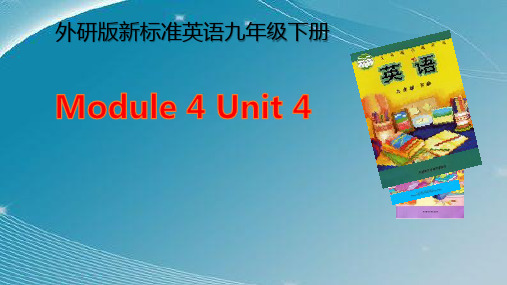中考英语考点聚焦四外研版-课件
外研版中考英语复习课件:book8A

│ 基础过关
类别
课标考点要求
Байду номын сангаас
词汇 拓展
·外研版
│ 基础过关
类别
课标考点要求
词汇 拓展
·外研版
│ 基础过关
类别
课标考点要求
重点 短语
·外研版
│ 重点突破
·外研版
│ 重点突破
·外研版
│ 重点突破
·外研版
│ 重点突破 句型透视
·外研版
│ 重点突破
·外研版
│ 重点突破
·外研版
│ 重点突破 语法聚焦
·外研版
│ 重点突破
·外研版
│ 重点突破
·外研版
│ 重点突破
·外研版
│ 重点突破
·外研版
│ 重点突破
·外研版
│ 重点突破
重点 句型
·外研版
│ 基础过关
类别
课标考点要求
重点 句型
·外研版
│ 基础过关
类别
课标考点要求
重点 句型
·外研版
│ 基础过关
类别
课标考点要求
语法 结构
·外研版
│ 重点突破 词汇点睛
·外研版
│ 重点突破
·外研版
│ 重点突破
·外研版
│ 重点突破
·外研版
│ 重点突破
·外研版
│ 重点突破
·外研版
│ 基础过关
类别
重点 单词
课标考点要求
·外研版
│ 基础过关
类别
重点 单词
课标考点要求
·外研版
│ 基础过关
类别
重点 单词
课标考点要求
·外研版
│ 基础过关
外研 高中英语必修4Module1reading(共24张PPT)

Everyone will be given a telephone number at birth that will never change 6. _w_h_e_r_e_v_e_r_/_n_o__m_a_t_t_er__w_h_e_r_e_ they live.
live in it? 4.What materials it is
made of/from?
glass
aluminium
wood
brick
rubber
steel
concrete
mud
plastic
What materials do we need to build them?
aluminum brick concrete glass
How the students would run a city in the year 2025
Garbage ships The city will load huge spaceships with waste materials and send them towards the sun.
Space travel It will be 10. _c_o_m__m_o_n_ for ordinary people to travel in space.
• Imagine what our school will be like 20 years from now. Share your idea with your partner.
外研版中考英语 第讲 词汇运用课件

点拨:方框中的词汇分别为:come true,动词短语,意为“实现” ;lucky,形容词,意为“幸运的”;shark,名词,意为“鲨鱼”; sleepy,形容词,意为“困倦的”;towards,介词,意为“向,朝”
2.单词拼写解题应注意的事项: ①要根据上下文之意,熟练运用所学词汇。 ②要理解全句,填准词,因为有时英汉并非一一对应。 ③要分析所填单词充当的句子成分,判断所填单词的词性。 ④要注意英汉语言之间的区别。对于有多个相同意思的单词 ,要选择最符合英语习惯的那个。 ⑤要规范、工整地拼写出单词,不要因书写而丢分。
【例2】 根据短文内容和所给中文提示,在空白处写出单 词的正确形式,每空限填一词。
Everybody knows the famous building—the Eiffel Tower, which was 1.built(建成) in Pairs,France,in 1889.The tower is 324 meters high,and it was the 2.highest(最高的) building in the world until 1930,when the Chrysler Building in New York 3.appeared(出现).
二、根据短文内容和所给中文提示,写出单词的正确形式 。每空限填一词。(2014,湖州)
You must have been around 15 years old.Do you feel different from that when you were 9 years old?Are you 6.wondering(想 知道) if you have already grown up?You may be a physical
九年级英语外研版上册课件:Module 4 Unit 1(共29张PPT)

9
用法2 wake up “叫醒,唤醒”,接宾语时,名词可放中
间,也可以放up的后面,代词必须放中间。此外,
wake up还常表示“醒来”。
举例 Don’t wake up the boy. He fell asleep
just now. 不要叫醒这个男孩。他刚刚睡着。
Please wake me up at five tomorrow morning.
一、听对话
听教材P26 Activity4 Listen and read的对话
录音,回答第1~3小题。
( B )1. Where are Betty and her parents?
A. At school.
B. At the train station.
C. At the bus station.
A. somebody
B. nobody
C. anybody
D. everybody
( A )2.James ________ after he arrived home.
A.woke his sister up
B.wake his sister up
C.wake up his sister
D.woke up her
4
它将从2号站台驶离。 我也是(很遗憾),但是我不能两周不上课。 嗯,确保你吃大量新鲜水果和蔬菜。
5
早上没有人叫你起床了。 您的火车要开了。 两周后见!
6
要点梳理
重点词汇精析
anybody的用法; wake up的用法
教材例句 There won’t be anybody to wake you up in the morning. 早上没有人叫你起床了。(教材第26页)
外研版英语九年级上册 Module 4 复习课件ppt

与turn相关的短语 1.打开 2.关闭 3.调高;出现 4.调低;拒绝
尼尔一过午夜就走了,杰克也是。
9. I felt tired and sleepy at school all day long.
sleep n/v. 睡觉
sleepy adj. 瞌睡的,困倦的 feel \ felt sleepy 感到困的
asleep 熟睡的
fall \ fell asleep 睡着的
9.shut ._s_h_u_t______(过去式)_sh__u_t____(过去分词)
10.ring_ra_n__g____(过去式)ru_n_g_____(过去分词) ……
11.burn_b_u_r_n_t_/_b_u_r(ne过d 去式)b_u_r_n_t_/_b_u_r_n(e过d 去分词) 12.empty__fu_l_l_____(反义词)16.任务;工作ta_s_k__ tidy up 13.tidy__u_n_t_id_y___(反义词)17.任何人_a_n_y_o_n_e_/anybody 打扫 14.独自的__a_lo_n__e___(英文) announcement 15.孤独的 _l_o_n_e_ly____(英文)18.通知____
状语从句
注意: although 和 but 不能同时使用
பைடு நூலகம்
结果状语从句
让步状语从句
so… that…/ such... that...
2023年中考备考英语学科总复习外研版:(精讲精练)七年级上册Module 1-4

2023年中考备考英语学科总复习—外研版七年级上册Module1-4考点一:Good.Hello,what about you?很好。
你好,你呢?【考点精讲】What/How about…?句型What about...?=How about...?意为“……怎么样?”,about为介词,后面跟名词、代词或动名词。
常见用法如下:►用于提出建议。
如:What/How about sth.?某事/物怎么样?What/How about doing sth.?做某事怎么样?常用肯定答语:Good idea./Sounds great/good./OK./All right.常用否定答语:Sorry,I.../Sorry,but.../I'm afraid.../I'd love/like to,but...►用于询问对方的情况或看法。
如:I like watching Readers.What about you?我喜欢看《朗读者》。
你呢?考点二:Who are the boy and the girl in front of Paul?保罗前面的男孩和女孩是谁?【考点精讲】辨析in front of,in the front of与in front图示用法in front of表示位置“在……(外部)的前面”。
……考点三:Gao Yan's in front of Daming and between Zhao Feng and Li Min.高燕在大明前面,赵峰和李敏之间。
考点四:Too much chocolate isn't good for you.吃太多巧克力对你不好。
【考点精讲】辨析too much,too many与much too辨析含义及用法示例too much 太多的,中心词是much,后接不可数名词。
too much work太多的工作too many 太多的,中心词是many,后接可数名词复数。
初中英语外研版九年下四模块4——复习—— 课件

A. need
B. must
C. No, you mustn’t D. No, you may not
C. have to
D. should
[ C]
[ C]
LOGO
It was evening. Tom and Mike were on their way to paying a visit to
LOGO
常用must, mustn’t, have to
• You must be careful with the knife. • We must mix everything in order to obtain the dough. • You must wash your hands before you eat. • You mustn’t pick flowers.
afternoon?
room?
-- I’d like to , but I _______ look after my -- ______. Please read it here.
sister at home , because my mother is ill.
A. Certainly
B. No, you needn’t
LOGO
常用 Will / Would / Could / Can you (please)…? Would you mind…?
• Could you pass me the ketchup, please?
LOGO
常用 Would you like …? Shall we / I…?
• Would you like some more? • Let’s go to the park, shall we? • Shall I take my bike, too? • Shall we go home now?
英语外研版九年级上册PPT课件 写作 语法聚焦四

模块语法聚焦四
实战演练
( )1.You have to leave now early bus. A.so that C.because [答案]A
you can catch the
B.as soon as D.if
模块语法聚焦四
( )2.—Did you catch what the teacher said?
C.Because
D.If
[答案]A
( )5.________ the sun was shining, it wasn't very warm.
A. Because
B.If
C.Although
D.Since
[答案]C
连句成篇
How to keep good relationship with parents __I_n_m__y_o_p_i_n_i_o_n__, I have too many rules at home. My parents never allow me to go out with my friends at night. They don't allow me to choose my own clothes, either. And they ___p_a_y_t_o_o_m__u_c_h_a_t_te_n_t_i_o_n_t_o____my exam results. I think my parents don't quite understand me. However, I ____tr_y_m__y_b_e_s_t___ to understand them. Although they don't allow me to make my own decisions and give me too much pressure I know that it is because they really love me and want me to have___a__b_r_ig_h_t_f_u_t_u_r_e___. ___I_n__o_rd_e_r_t_o___keep good relationship with my parents, I study hard, listen to them, talk to them as friends, tell them my troubles, and help them do more housework.
- 1、下载文档前请自行甄别文档内容的完整性,平台不提供额外的编辑、内容补充、找答案等附加服务。
- 2、"仅部分预览"的文档,不可在线预览部分如存在完整性等问题,可反馈申请退款(可完整预览的文档不适用该条件!)。
- 3、如文档侵犯您的权益,请联系客服反馈,我们会尽快为您处理(人工客服工作时间:9:00-18:30)。
考点聚焦四一、要点梳理◆1. somewhere⑴ somewhere 作为副词,意为“在某处,到某处”,例如:I have seem him somewhere before.我以前在哪儿见过他。
⑵ somewhere 另一词性,是代词(不定代词),而不是名词。
例如:we need to find somewhere to live. 我们得找个住的地方。
『常用搭配』get somewhere有进展;somewhere around \between大约,……左右。
和 about 意思相同。
【链接中考】(江苏省无锡市)I can’t find my watch, but it must be _______ in this room.A. everywhereB. nowhereC. anywhereD. somewhere【答案】D◆2. nobodynobody是代词,意为“没有人, 无人, 谁也不”。
There is nobody there. 那里没有人。
『辨析活用』no one, nobody与none⑴ no one=nobody,两者均只能指人,不能指物;用作主语时,谓语动词一般用单数。
例如:No one [Nobody] likes it. 没人喜欢它。
⑵ none 既可指人也可指物,其后通常接of短语;用作主语时,若指不可数名词,谓语只能用单数,若指可数名词,则谓语可用单数(较正式)也可用复数(用于非正式文体,但更符合惯用法)。
例如:None of the food was left. 一点食物都没留下。
None of the books is [are] interesting. 没有一本书有趣。
⑶ none 往往暗示有一定的范围(这种范围通常就表现在其后的 of 短语上),而 no one 或 nobody 则不暗示这种范围。
例如:A: Did any of your friends come to see you? 你的朋友当中有谁来看过你吗?B: None. 一个也没来。
A: Did anyone come to see you? 有人来看过你吗?B: No one [Nobody]. 谁也没来(from )。
◇none 有时暗示一种数量,即指数量上“一个也没有”,而 no one 或 nobody 则往往表示一种全面否定,即指“谁都没有”,所以在回答 how many 或 how much 的提问时,通常用 none,而在回答 who 的提问时,通常用 no one 或 nobody。
例如:①— How many English books have you read? 你读过多少本英文书?— None. 一本也没读。
②— Who went to see the film? 谁去看电影了?— No one [Nobody]. 谁也没去。
【链接中考】(湖南长沙)1. — Who helped you clean the classroom yesterday?— ______. I cleaned it all by myself.A. SomebodyB. NobodyC. Everybody【答案】B(江苏省苏州市)2. —Wow! You’ve got so many skirts.— But _______ of them are in fashion now.A. allB. bothC. neitherD. none【答案】D(湖北省武汉市)3. — How many students are there in the classroom?— ________. They are all in the lab.A. SomeB. NoneC. AllD. Neither【答案】B◆3. allall修饰名词主语时,可放在主语或行为动词之前,但要放在be动词之后。
当be动词是句中最后一个词时,all要放在动词之前。
例如:All the boys study well? The boys all study well? 孩子们都学习得很好。
— Are you young pioneers? 你们是少先队员吗?— Yes, we all are. 是的,我们都是少先队员。
『辨析活用』all和both表示“全体”,可用all和both,但all表示三个或三个以上的人或物的“全体”,而both则表示两个人或物的“全体”。
例如:All the five students are from the USA.五个学生都来自美国。
Both the two girls are pretty.两个女孩都长得漂亮。
『常用搭配』⑴ all of 实足(后面如果加代词,代词前面不需要修饰词)例如:All of them like disco dance. 他们都喜欢迪斯科舞。
⑵ all与not连用通常表示“部分否定”。
例如:All my friends cannot swim. 我所有的朋友并不都会游泳。
I don’t know all of them. 我并不都认识他们。
⑶ at all作“完全,根本”解,多用于否定句,条件句。
如用于肯定句,疑问句。
可作“真的,确实”解。
例如:If it were not for the sun, we could not live at all. 如果没有太阳,我们根本不能生存。
⑷ all over到处,全部He’s wet all over.他浑身湿透。
⑸ all alone独自I’m all alone here at present.目前我单独一人在这里。
【链接中考】(河南省)To help Tommy learn better, his parents have done they could: cards, tapes, special learning centers, in short, everything they can think of.A. bothB. allC. noneD. neither【答案】B◆4. joinjoin意为“加入某一种组织,成为其中一员”,join后面还可接表示人的名词或代词,表示加入到某人或某些人的行列中去。
例如:My uncle joined the party in 1998.我叔叔是1998年入党的。
『辨析活用』◇join in表示“加入,参与”某种活动,in之后可接名词或动词-ing形式,表示“参加某人的活动”,可以说join sb. in (doing) sth.。
例如:He joined them in the work.他同他们一起工作。
Will you join us in playing basketball?你跟我们一起打篮球好吗?◇take part in指参加会议或群众性活动,重在说明句子主语参加该项活动并在其中发挥作用。
例如:The teacher took part in our discussion yesterday.昨天老师参加了我们的讨论。
(2010福建三明市)—I’m afraid English is too hard for me.— _______, and you will improve it!A. Join the English clubB. Go to the concert oneC. Stay up last【答案】A◆5. agoago副词,意为“以前”,主要用于一般过去时。
例如:He met her three days ago. 他三天前碰到过她。
『辨析活用』ago和beforeago和before都可用作副词与时间段连用,表示“……之前”,但它们的用法有所不同。
“时间段+ago”,表示从说话时刻算起的若干时间以前,常用于一般过去时;“时间段+ before”,表示从过去某时起若干时间以前,与过去完成时连用。
例如:He was here an hour ago. 他一小时前还在这里的。
I have never seen him before. 我以前从未见过他。
◇before可作介词,后接时间点;也可作连词,引导时间状语从句。
而ago不能用作介词和连词。
例如:He will be back before five o’clock. 他会在五点钟以前回来。
I’ll ring you up before I leave home. 我离家以前将给你打电话。
【链接中考】(青海省,宁夏)1. — Have you read this book?— Yes. I ______ it two weeks ago.A. am readingB. have readC. will readD. read【答案】D(2010广西南宁)2. Mr. Brown knew nothing about the good news ______ his wife told it to him.A. beforeB. afterC. sinceD. if【答案】A◆1. pick uppick up表示“拾起”,“拿起”,“捡起”等意思。
pick up是由“动词+副词”构成的短语,后面接代词作宾语时要把代词放在动词和副词之间。
例如:I would have picked it up if I had noticed it. 我如果看见的话, 我早就把它拣起来了。
(山东省烟台市)The ticket is on the floor, please _______.A. pick up itB. look forC. pick it upD. look it up【答案】C◆1. How does Tony get to school?how作疑问副词, 引起问句(表示方法,手段,状态),意为“如何, 怎样”。
例如:How does he go to school? 他是怎样去上学的?回答时常用一下两种形式:⑴“by+doing”可以表示方法、手段或原因,此时by的介词短语多用作状语。
By working hard I made great progress this term. 通过刻苦努力,我在本学期取得了巨大的进步。
⑵“by+名词”也可以用来表达方式或手段,尤其用于表示运输或取道的方式。
I go to work by bike every day. 我每天骑自行车上班。
【链接中考】(湖北省襄樊市)— ______ do you study for a test ?— I study by working with a group .A. WhereB. HowC. WhenD. Why【答案】B◆2. —Why didn’t they want them?—Because they wanted …在回答why的问句时,应该用because来回答。
